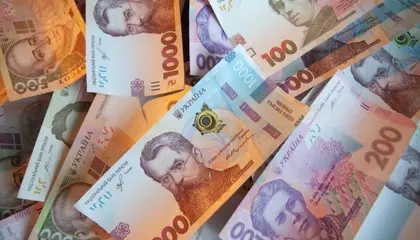Bonds: Banks have strong interest in reserve bonds
Last week, primary-dealer banks purchased UAH15bn (US$410m) of bonds that are allowed to cover required reserves, part of which they resell to other banks.
JOIN US ON TELEGRAM
Follow our coverage of the war on the @Kyivpost_official.
At the primary auction, the Ministry of Finance sold a new portion of bills that banks can use to meet mandatory reserve requirements. Initially, the MoF planned to sell UAH9bn (US$246m) of these securities, but later increased the limit to UAH15bn (US$410m), and they were sold in full (see details in the auction review).
Trading in the secondary market more than doubled to UAH11bn (US$301m) thanks to deals in "reserve" bonds totalling UAH6.2bn (US$169m). The second-most traded paper, at UAH2.3bn (US$63m), was the bond maturing in February 2025. In total, there were 46 deals with "reserve" bonds and 508 deals with bonds due February 2025.
As expected, portfolios of UAH bonds owned by banks increased by UAH14.9bn (US$407m). Non-banking institutions increased investments in local-currency securities by UAH145m (US$4m) and individuals by UAH0.7bn (US$19m). Only foreigners reduced investments in UAH government bonds by UAH0.7bn (US$19m).
ICU view: Most likely, banks bought the entire issue of "reserve" notes and traded them on the secondary market last Wednesday. However, individuals and non-banking institutions seem to have bought the majority of the offer in bonds maturing in February 2025. Foreigners reduced their investments in hryvnia instruments for the sixth week in a row and sold bonds maturing in February 2025, in particular.

ICU Weekly Insight: Jan. 24, 2024 – FX-Denominated Bills Support State Budget
It seems that the Ministry of Finance will no longer offer bonds maturing in November 2025, and tomorrow will offer UAH10bn worth of paper maturing in August 2025. Banks need at least UAH15bn (US$410m) of bonds to fully utilise their limits. So, next week, the MoF may offer "reserve" bonds, but with maturity in April 2025, to distribute the debt burden evenly.
Bonds: Eurobond prices fluctuate under influence of global sentiment
Ukrainian Eurobonds remain influenced by the traditional combination of global sentiment toward emerging markets and purely Ukrainian factors.
Prices were little changed last week, with a slight increase from 17‒23 cents to 17‒24 cents on the back of a small price increase at the short end of the curve of about half a percent. VRIs continued to be traded slightly above 27 cents per dollar of notional value.
ICU view: US Treasuries—the benchmark for Ukrainian Eurobonds—rose last week, but weak interest in emerging markets offset their impact. Ukrainian factors remained almost unchanged. The upcoming start of the new IMF lending program seems to be fully priced in by the market.
FX: Hryvnia exchange rate continues to strengthen
The FX market maintains a positive sentiment; the hryvnia continues to appreciate in the cash segment while NBU interventions in the interbank market remain relatively low.
Individuals are gradually reducing the volume of hard currency purchases, causing strengthening of the hryvnia exchange rate in the leading retail banks by another 0.3% to UAH37.9‒38.8/US$, compared with UAH38.2‒39.2/US$ a week before. Accordingly, cash hryvnia appreciated 5% vs US dollar YTD. The bid-offer spread narrowed by UAH0.05 to UAH0.93 due to a larger decline in the offer exchange rate.
On the interbank market, clients (legal entities) of banks again actively sold hard currency. In four days, they sold US$65m more than they bought. Therefore, NBU interventions on the sale of hard currency slid to US$280m.
ICU view: The FX market is under the positive influence of farmers’ selling FX to fund spring field work, as well as the general improvement of exchange rate expectations of the population and business. Long-term strengthening of the cash hryvnia reduces retail clients’ demand for FX, including for deposits. At the same time, banks are still cautiously watching the trend and keeping the bid-offer spread quite wide.
Economics: Inflation to keep decelerating rapidly
Ukraine’s annual inflation decelerated to 24.9% in February, down from 26.0% in January and is likely to stay firm on a downward trajectory in the coming months.
Monthly growth in consumer prices has been 0.7‒0.8% since November, which is much lower than inflation over the same period a year ago. The largest deceleration in the annual growth rate has been registered for transportation services (33.6% vs. 41.0% in Jan). Prices for food, the largest component of the consumer basket, decelerated to 31.5% from 32.8%. Noteworthy, while headline inflation has been trending down since December, core inflation also reversed its accelerating trend since February.
ICU view: We expect a very strong base effect to come into play in March as last year consumer prices were surging amid the unfolding of russia’s invasion, which disrupted logistics and reduced the supply of goods and services. Annual inflation will, thus, decelerate even more rapidly. Overall, disinflationary factors clearly prevail at the moment, including weak domestic demand, stable utility tariffs, and fixed exchange rate. We see a good chance of CPI decelerating to 15‒16% by the end of 2023, more significantly than envisaged by the current NBU projection (18.7% YoY).
Economics: NBU reserves down 3.4% in February
NBU gross international reserves decreased 3.4% to US$28.9bn in February as inflow of international financial assistance was less substantial compared with January.
Last month, Ukraine received US$2.1bn from the WB, including US$1.25bn in grant funds from the US (via WB trust fund). Meanwhile, the central bank had to sell US$2.5bn in the interbank market to keep the hryvnia exchange rate stable. Also US$450mn debt was repaid to the IMF and the WB.
ICU view: NBU reserves will remain volatile through 2023, as the inflow of international financial assistance may not be smooth. Nevertheless, we expect gross reserves will exceed US$30bn at year-end thanks to generous grants and loans from Ukraine’s international partners.
RESEARCH TEAM: Vitaliy Vavryshchuk, Alexander Martynenko, Taras Kotovych
See the full report here.
You can also highlight the text and press Ctrl + Enter






